China Animals
No Animal Harmed in the Making of This Film? Alleged Dog Abuse at Hengdian World Studios Angers Chinese Netizens
Animal abuse or a really good dog actor?
Published
6 years agoon
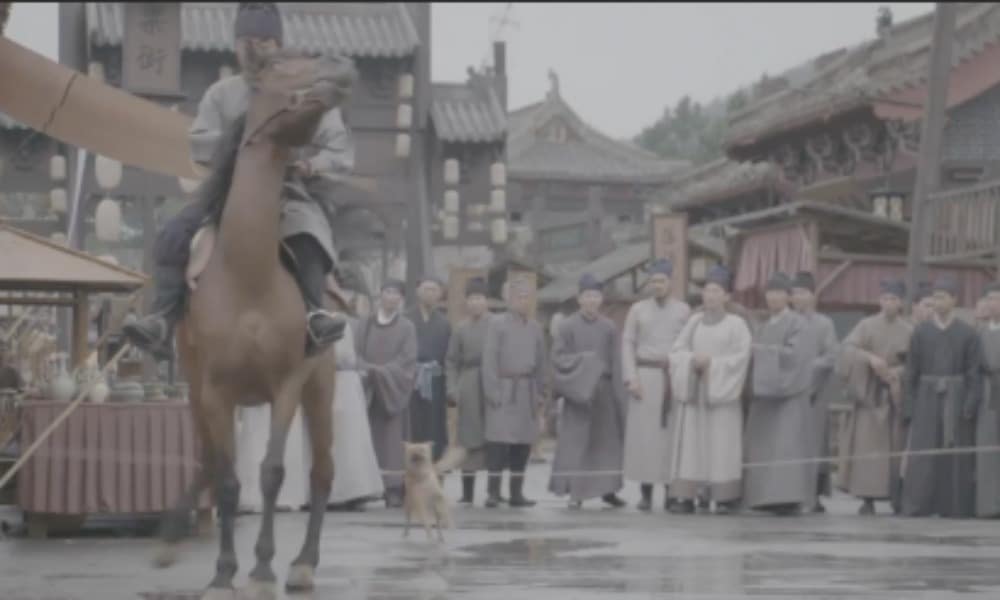
First published
An alleged case of dog abuse went viral on Chinese social media this week, after backstage footage of a violent scene was shared online. Dog actor ‘Xiao Huang’ is now praised for his hard work.
“No animal was harmed in the making of this film” is a standard message most viewers are used to seeing at the end of many movies, but in the case of this Chinese production, many netizens fear it is not the case.
Entertainment blogger and actor Ren Tao (任涛), who often posts behind-the-scenes videos, posted a clip and some photos on Weibo that allegedly exposed how a dog was purposely harmed during the filming of a costume drama at Hengdian World Studios (横店影视城) (see footage as posted by BJTime in embedded tweet below).
Is this dog abuse or is this just a good dog actor? Chinese TV drama denies trending rumors of dog abuse, but the controversy continues: https://t.co/LlnszRGUQz pic.twitter.com/rxZFEKVSsT
— What's on Weibo (@WhatsOnWeibo) May 9, 2019
The footage shows a Chinese rural dog on a film set. Tied to a chord from two sides, the dog is pulled behind a horse that lashes out with its hooves. The actor on the horse also seems to direct the horse to kick the little dog, which falls down on the floor multiple times.
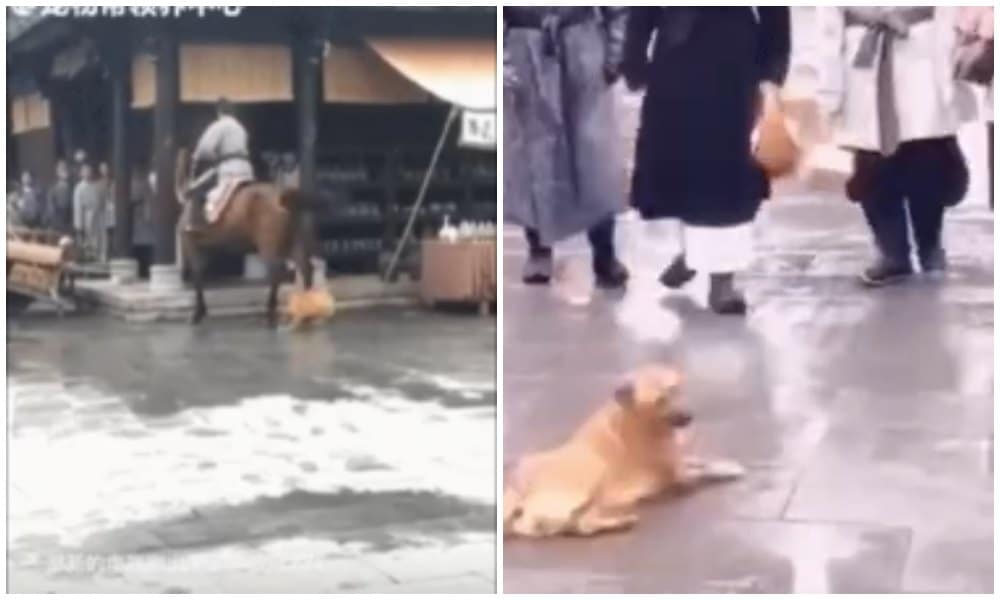
A second clip shows the dog twitching on the floor, seemingly unable to get up, while various cast members are looking at it without doing anything.
Ren Tao wrote: “The small dog was kicked by the horse several times, and after the scene was shot the director was indifferent and left. How cold*!” *[lit. “Warmth or coldness is the way of the world.”]
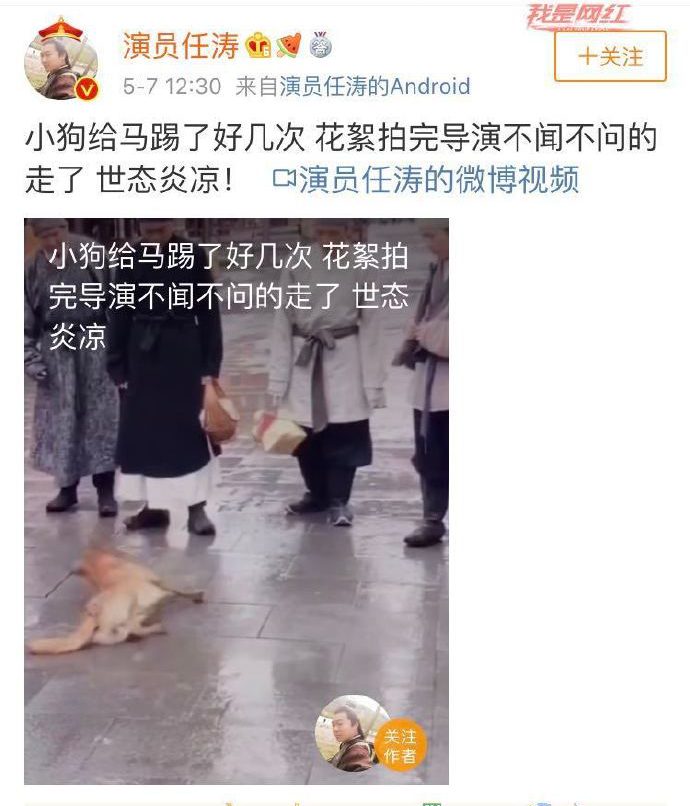
Hengdian World Studios, founded in 1996, is known as the largest outdoor film and TV studio in the world.
Although the actor later removed his original post of May 7, it had already been reposted and picked up by various Weibo accounts, including that of a popular pet blogger, who wrote that the crew and cast showed “no humanity.”
The pet blogger also mentioned the existing agreements of American producers and filmmakers regarding the wellbeing of animals on the set. The American Humane Association is the organization that monitors productions and awards the “No Animals Were Harmed” end credit.
“Film and television works are meant to disseminate culture, not to seek after profits and becoming a slaughterhouse for animals,” the blogger wrote. (See the clip they posted in the embedded tweet below).
This is the short clip that went viral on Weibo this week, stirring discussions on alleged animal abuse on a Hengdian Film Studios TV drama set: https://t.co/LlnszRGUQz pic.twitter.com/7l1h3TqOBU
— What's on Weibo (@WhatsOnWeibo) May 9, 2019
The hashtag “Cast and Crew Abuse a Dog” (#剧组虐狗#) soon took off on Weibo, receiving over 15 million views.
Hundreds of commenters responded with anger, calling for a boycott of the production and condemning those involved.
Xiao Huang: Working Like a Dog
On May 8, the official account of the TV drama Held in the Lonely Castle (孤城闭) responded to the controversy with a lengthy statement and video, writing: “Today in our backstage area the news reached us of the online circulation of a video relating to “cast and crew members abusing a dog.””
The account states that the scene that was being filmed that day is from Feng Menglong’s “The Book of Horses and Dogs,” and that the dog that is featured in this scene is named ‘Xiao Huang,’ a “much-loved dog” who made a “guest appearance” in the drama.
The statement says that the horse and the dog were both tied to ropes to secure their position for the filming and to prevent them from running away. The staff controlling the ropes are there to make sure that the animals will not be hurt.
“Xiao Huang was not really kicked by the horse,” the post says, explaining that the rope was pulled at the same time the horse kicked, to make Xiao Huang trip and make it seem he was kicked. A fake horse leg was allegedly used for close-up scenes.
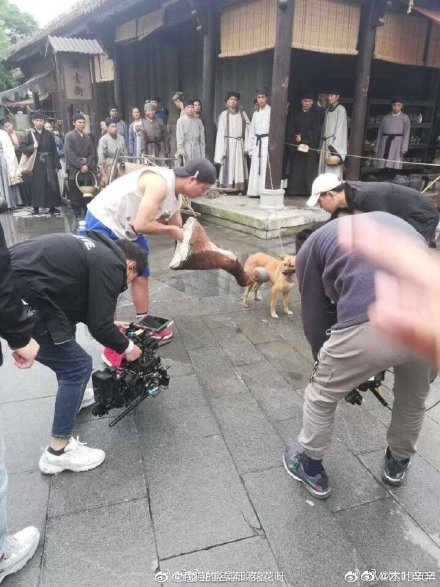
After the shooting was finished, the staff quickly calmed the horse and Xiao Huang, the post says.
About the video in which the actors look at the dog while it is falling down, seemingly injured, the statement says this scene was “important to the plot.” A veterinarian came to the set to put the dog under anesthesia beforehand, and the dog’s reaction was because of the after-effects of anesthesia – not because of being kicked by the horse.

The account post further says that the crew took care of the dog after the filming was completed, making sure it was ok until the anesthesia after-effects wore off, and then gave it food and let it play on the set.
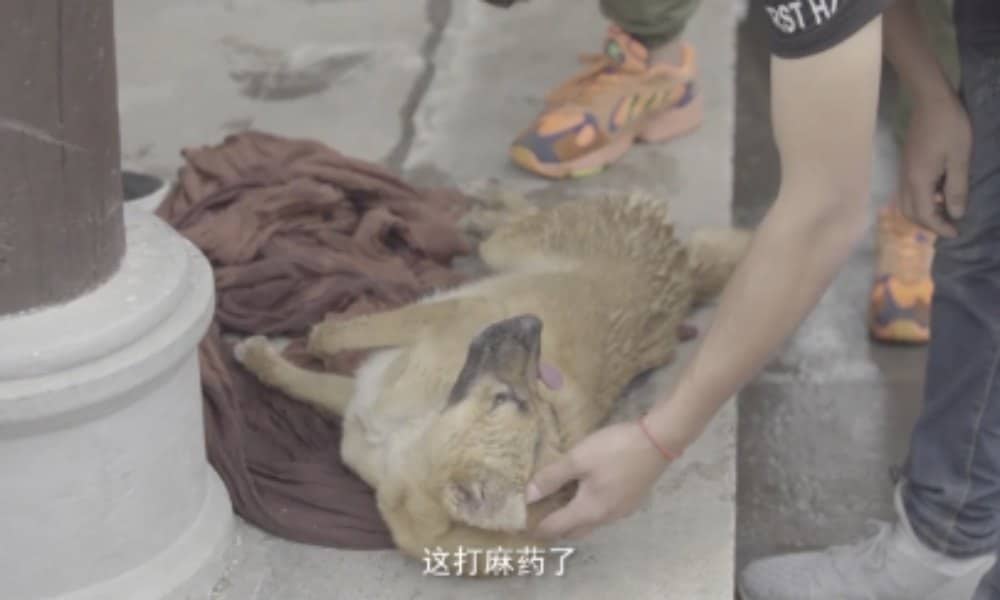
“Xiao Huang was never injured and is well cared for,” the statement concludes: “Please respect the hard work of our crew and don’t spread rumors.”
The denial of the abuse became even bigger than the original story; the hashtag “‘Held in the Lonely Castle’ Cast & Crew Deny Dog Abuse” (#孤城闭剧组否认虐狗#) was viewed nearly 30 million times at the time of writing.
A Dog and Pony Show?
The TV drama production’s statement has led to many reactions online. “The horse and the dog are both such good actors, and the crew is very hardworking,” a typical comment on Weibo said.
Others praise Xiao Huang for his hard work, and condemn the rumors about animal cruelty, saying the working methods of the crew show great progress in China’s treatment of animals.
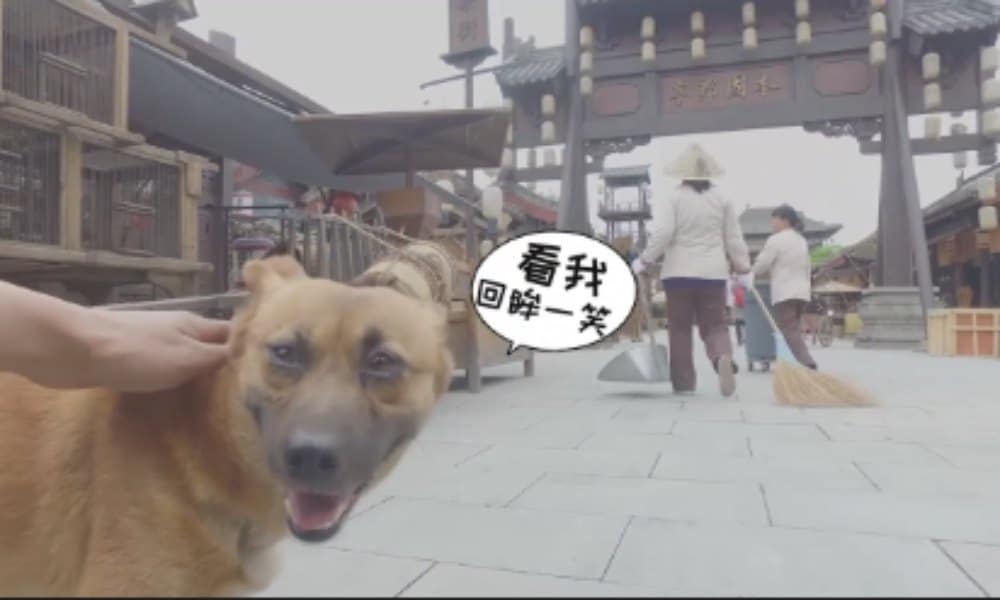
But some are still skeptical and say they do not believe the provided statement, believing that the denial of rumors was only staged to avert controversy and promote the TV drama.
One Weibo blogger shared slow-motion footage of the backstage video, showing that Xiao Huang was tossed around by the horse’s leg during shooting. It also shows redness and baldness in the dog’s neck area.
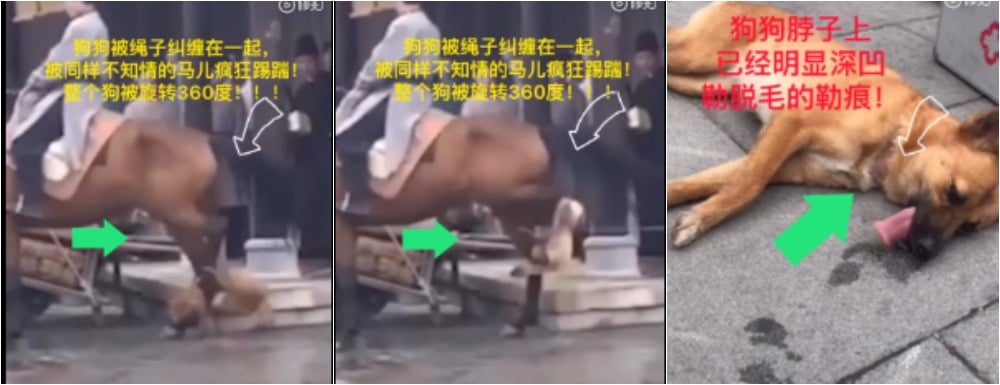
“Abuse is abuse,” the Weibo user writes, denouncing the treatment of the dog during shooting, and criticizing the fact that the dog was given anesthesia.
Cases of dog abuse often go viral on Chinese social media. In 2017, the killing of a pet dog by a neighborhood guard triggered many online calls for rapid implementation of animal welfare legislation in China.
In 2016, a group of animal welfare activists in Chengdu took the law into their own hands when they publicly beat up a man who abused his dog. Meanwhile, the annual Yulin Dog Meat festival seems to get more controversial by the year.
On Weibo, the Xiao Huang case is not over yet. While some netizens side with the production team, others refuse to believe the dog was not harmed.
“I think it’s sad for the dog either way,” some write. Meanwhile, the official page of the Held in the Lonely Castle TV drama posted another photo of ‘Xiao Huang,’ writing: “The most conscientious official is our best representative.”
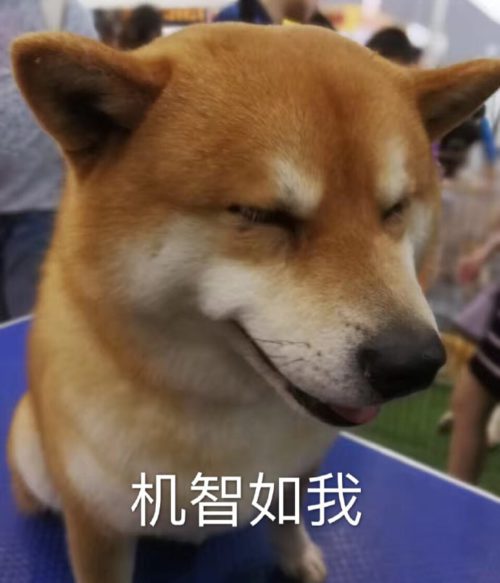
By Manya Koetse
Spotted a mistake or want to add something? Please let us know in comments below or email us.
©2019 Whatsonweibo. All rights reserved. Do not reproduce our content without permission – you can contact us at info@whatsonweibo.com
Manya is the founder and editor-in-chief of What's on Weibo, offering independent analysis of social trends, online media, and digital culture in China for over a decade. Subscribe to gain access to content, including the Weibo Watch newsletter, which provides deeper insights into the China trends that matter. More about Manya at manyakoetse.com or follow on X.

China Animals
China Faces Unprecedented Donkey Shortage Crisis
“We have plenty of cattle and horses in China now — just not enough donkeys” (“目前我国牛马都不缺,就缺驴”).
Published
1 week agoon
October 5, 2025
China is facing a serious donkey shortage. China’s donkey population is far below market demand, and the prices of donkey-related products continue to rise.
Recently, this issue went trending on Weibo under hashtags such as “China Currently Faces a Donkey Crisis” (#我国正面临缺驴危机#).
The Donkey Branch of China’s Livestock Association (中国畜牧业协会驴业分会) addressed this issue in Chinese media earlier last week, telling China News Weekly (中国新闻周刊): “We have plenty of cattle and horses in China now — just not enough donkeys” (“目前我国牛马都不缺,就缺驴”).
China’s donkey population has plummeted by nearly 90% over the past decades, from 11.2 million in 1990 to just 1.46 million in 2023.
The massive drop is related to the modernization of China’s agricultural industry, in which the traditional role of donkeys as farming helpers — “tractors” — has diminished. As agricultural machines took over, donkeys lost their role in Chinese villages and were “laid off.”
Donkeys also reproduce slowly, and breeding them is less profitable than pigs or sheep, partly due to their small body size.
Since 2008, Africa has surpassed Asia as the world’s largest donkey-producing region. Over the years, China has increasingly relied on imports to meet its demand for donkey products, with only about 20–30% of the donkey meat on the market coming from domestic sources.
China’s demand for donkeys mostly consists of meat and hides. As for the meat — donkey meat is both popular and culturally relevant in China, especially in northern provinces, where you’ll find many donkey meat dishes, from burgers to soups to donkey meat hotpot (驴肉火锅).
However, the main driver of donkey demand is the need for hides used to produce Ejiao (阿胶) — a traditional Chinese medicine made by stewing and concentrating donkey skin. Demand for Ejiao has surged in recent years, fueling a booming industry.
China’s dwindling donkey population has contributed to widespread overhunting and illegal killings across Africa. In response, the African Union imposed a 15-year ban on donkey skin exports in February 2023 to protect the continent’s remaining donkey population.
As a result of China’s ongoing “donkey crisis,” you’ll see increased prices for donkey hides and Ejiao products, and oh, those “donkey meat burgers” you order in China might actually be horse meat nowadays. Many vendors have switched — some secretly so (although that is officially illegal).
Efforts are underway to reverse the trend, including breeding incentives in Gansu and large-scale farms in Inner Mongolia and Xinjiang.
China is also cooperating with Pakistan, one of the world’s top donkey-producing nations, and will invest $37 million in donkey breeding.
However, experts say the shortage is unlikely to be resolved in the short term.
The quote that was featured by China News Weekly — “We have cows and horses, but no donkeys” (“牛马有的是,就缺驴”) — has sparked viral discussion online, not just because of the actual crisis but also due to some wordplay in Chinese, with “cows and horses” (“牛马”) often referring to hardworking, obedient workers, while “donkey” (“驴”) is used to describe more stubborn and less willing-to-comply individuals.

Not only is this quote making the shortage a metaphor for modern workplace dynamics in China, it also reflects on the state media editor who dared to feature this as the main header for the article. One Weibo user wrote: “It’s easy to be a cow or a horse. But being a donkey takes courage.”
By Manya Koetse
(follow on X, LinkedIn, or Instagram)
Spotted a mistake or want to add something? Please let us know in comments below or email us. First-time commenters, please be patient – we will have to manually approve your comment before it appears.
©2025 Whatsonweibo. All rights reserved. Do not reproduce our content without permission – you can contact us at info@whatsonweibo.com.
China Animals
Behind the Mysterious Death of Chinese Internet Celebrity Cat Wukong
“Dont believe the media,” Zhao Shuo said: “And also don’t believe me.”
Published
5 months agoon
May 11, 2025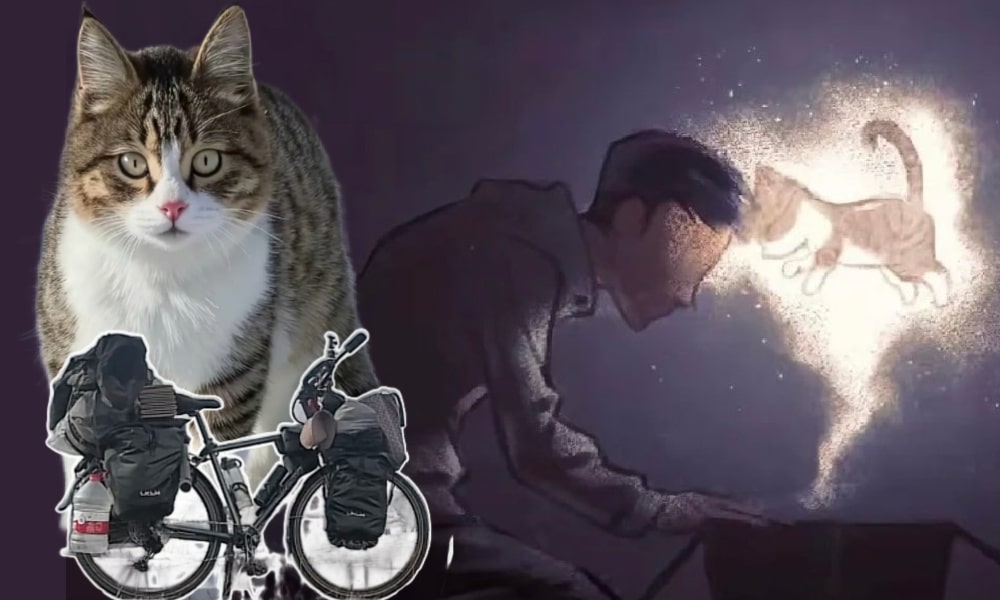
How did the death of a young stray cat lead to a online wave of grief and outrage over the past few days? It started with fans mourning a beloved Chinese internet celebrity cat, then turned into backlash against fake news, anger over animal cruelty groups, and suspicions that local officials were more concerned with controlling the narrative than finding the truth.
Although things turned dark quickly, it began beautifully light.
The journey of Chinese cyclist Zhao Shuo and his cat Wukong seemed to come straight out of a novel. Zhao Shuo, the protagonist: a solitary traveler who would cycle through snow-covered mountains and endless desert roads for days on end, seriously disciplined and focused.
Then came Wukong, the playful and spirited stray cat who suddenly appeared, curled up inside his tent, purring happily beside him as if they had always been together. She found just the warmth she needed – and so did he.
From Stray Cat to Star Status: Wukong and Zhao’s Journey
Zhao Shuo (赵朔) is a Chinese cyclist who runs a social media account about his adventurous travels, cycling and camping in China’s western regions. Since 2023 – starting in Xi’an — he has been documenting his remarkable journey on his Douyin account “Notes from Zhao Shuo’s Western Journey” (@赵朔西行漫记), which now has over three million followers.
In his videos — often long-form by Douyin standards (ranging from 12 to 40 minutes) — he offers viewers a glimpse into his ‘bikepacking’ life, cycling across West China, including Tibet, Xinjiang, and Qinghai, where he sometimes goes days without seeing another person, coming across lush green areas and dry, sandy territories while dealing with extreme temperatures.

Zhao Shu’s adventurous bicycle and wild camping travels, documented on Douyin. Screenshots via whatsonweibo.com.
Zhao had already published dozens of videos of his bicycle tour when he first introduced the kitten he named ‘Wukong’ (悟空) to his followers.
On October 30, 2024, while camping out in a village in Kanas (喀纳斯), near the main peak of the Altai Mountains (阿勒泰) in northern Xinjiang, the stray appeared in front of his tent at 4 am, waking him up with her cries. The kitten seemed cold and hungry. She had a small injury near her mouth and might have been a target in an area filled with stray dogs.
When he allowed her to step inside his tent, she soon comfortably settled inside his sleeping bag and purred away (video). In the morning, she stuck around the tent, Zhao fed her, and the two bonded.

Wukong on the night she ‘adopted’ her human master.
Of course, Zhao was smitten – and so were his followers – how could he possibly leave his ‘Wukong’ behind now? A suitable and creative nickname, ‘Wukong’ is the legendary Monkey King in the classic Chinese novel Journey to the West (西游记). Like the monkey’s 72 transformations, he hoped the cat would have 72 lives instead of just nine, and decided to take her along with him.
Wukong made Zhao’s travels a lot more lively, but also a bit trickier — he had to rearrange his cycling gear to accommodate her, including a special cat backpack and a basket out front, and now he was cooking for two.

A new travel companion.
But it was all worth it. Wukong, who Zhao endearingly called his “stinky cat” (臭喵), grew bigger, chubbier, and braver, and the two became inseparable. By late December, it was minus 20 degrees Celsius (−4°F) when the two visited the scenic Sayram Lake (赛里木湖), where they played in the snow — something they would do far more often later on in their journey.

Playing in the snow – a favorite pastime of Zhao and Wukong.

Snow adventures at the lake, by @奶盖味的小山竹.
So far, so cute – the story of the lonely traveler Zhao finding an unexpected companion in the little stray Wukong resembles that of the Scottish Dean Nicholson, who found a best friend in Nala while cycling through Bosnia and then taking her along cycling around the world. It even led to the book Nala’s World.

The story of Zhao and Nala shows some resemblance to that of Dean Nicholson and his cat Nala, about which he wrote the book Nala’s World. (Image via Traveling Cats).
Zhao kept Wukong close, but still gave her enough freedom to roam around. In the late afternoons or at night, she would play around the tent — or in the guesthouse room when temperatures dropped too low. She often hunted for mice and would proudly bring Zhao her catch. She always returned to him. In December, as they passed through areas with more cars and traffic, Zhao got Wukong a cat leash and a GPS collar for safety.
Chinese netizens and media quickly took notice as the special bond between the cyclist and his cat deepened — the two literally sticking together through snow and wind, sunshine and rain. In December 2024, they even made the news for unexpectedly boosting sales of a Xinjiang yogurt brand featured in many of Zhao Shuo and Wukong’s videos. Zhao’s travels, with Wukong the internet celebrity cat as his ‘mascot,’ seemed to bring positive attention to Xinjiang and its various regions.
“It’s Done”: Wukong Is Gone
The happy story of Zhao and Wukong abruptly ended on April 15. In a video posted to Douyin in the middle of the night, Zhao Shuo, his eyes glassy and his appearance stressed, explained that Wukong had a run-in with a car earlier that day and was now “eternally resting.”
Standing on the side of the road in Ruoqiang (若羌), with Wukong’s remains in a cardboard box, Zhao said he had just gotten a car from the Miran Site (米兰遗址) to try and find a freezer to store the remains of his cat friend, hoping some of his followers could help. The video received more than 116,000 replies.

The midnight call for help from Zhao in Ruoqiang.
However sad, Wukong’s death initially did not attract as much attention outside the Zhao and Wukong online fan circles. The case really began receiving widespread attention in the weeks that followed, as what first appeared to be a tragic accident started raising unsettling questions.
In early May, Zhao Shuo posted a 42-minute video (link to copy) recounting the various developments — from how Wukong died to everything that followed.
On April 15, Zhao Shuo and Wukong woke up at their campsite near the visitor center of the Miran Ruins (米兰遗址) — the remains of an ancient Silk Road settlement and Buddhist religious center located in Ruoqiang County.
Zhao had slept in that day until 3pm due to a rough, sleepless night the previous night. Zhao got out of his tent to go to the public toilet nearby, chatted with some visitors, and Wukong was following him as usual, staying near and playing around the square in front of the visitor center. Zhao put the GPS collar on her around 4 pm.
After 4 pm, Zhao briefly went into the main hall and took some photos. Wukong did not go in with him and remained at the front of the hall. Inside, Zhao inquired about the best route to continue his travels from Ruoqiang in Xinjiang toward Qinghai. He exited around 4:20 and visited the museum on the premises. It wasn’t until later in the afternoon, when he returned to his campsite, that he found Wukong was no longer there — not at their spot, not at the site.
By 6 pm, he went out looking for her. Thanks to the GPS system, he found — to his surprise — that Wukong’s location was over two kilometers away, and that there had been some disturbance in the signal.
He kept the camera rolling as he headed out on his bike to look for her, calling her name through an area of desert and empty highway. Then came the tragic moment Zhao spotted Wukong lying by the side of the road: “Oh god. I can’t believe my eyes, Wukong!” he said, the shock and pain visible on his face. The little cat was already lifeless and stiff. (Original video on Douyin removed; reuploaded video on YouTube: this is the moment Zhao finds Wukong)

Their heartbreaking final ride together.
“The stinky cat has been running around,” Zhao said, his voice breaking. “It’s done.” In a moving scene, he placed her in the basket on the front of his bike to take their final ride together and bring her back to the camp.
“Inexplicable Death, Full of Suspicious Points”: Zhao Searches for Answers
Back at the camp, Zhao walked around with Wukong’s stiff body in his arms, placing her on the ground and then picking her up again, seemingly overwhelmed with grief and unsure of what to do next.
Perhaps speaking more to himself than his viewers, he wondered how this could have happened — there was nothing but desert out there, with only a patch of green near his campsite. Wukong always stayed close, and there was nothing beyond to explore. How had she ended up so far from the site, all the way out by the national highway?
Once he collected himself, Zhao’s first priority was to cool Wukong’s remains. He packed up his belongings, arranged for a car, and made his way to Ruoqiang. There, he arranged storage for his bike and posted that video asking his followers if anyone could lend him a freezer. After that was taken care of, he spent the following days organizing a vehicle and a portable icebox. With Wukong stored in the back of the car, he returned to Miran to check the security footage — only to find that nothing had seemingly been recorded due to a malfunction.
The complete lack of surveillance footage was not the only peculiar detail surrounding the death of Zhao’s cat. To his surprise, he came across a news article from the well-known Chinese media outlet Jiupai News (九派新闻), reporting on Wukong’s death. The article had been published just hours after Zhao posted his first video announcing her passing and within 24 hours of her death.
In the report, published on April 16 at 14:04, reporter Huang Qiaowen (黄巧文) wrote that Wukong had died in a car accident, citing police as saying that the cat had crawled under a car and was accidentally run over when the driver started it. The article claimed the matter had already been resolved.
But according to Zhao, he had no idea how his cat had actually died — and had never come to any “understanding” with a car owner. “Which car owner? I don’t know anything,” he said. “This is considered a relatively big media outlet, it’s truly a blatant fabrication.”
Zhao added that he had spoken directly with the police, who told him they had no details about the incident beyond what he himself had reported, making the news story entirely false.
Zhao Shuo decided to set out again in a rental car on April 19, driving nearly 900 kilometers (560 miles) from Ruoqiang, via Korla, to Urumqi — the capital of Xinjiang. There, he visited three different pet hospitals to have Wukong examined, including both an X-ray and a CT scan.

The scans showed that Wukong’s organs and bones were intact.
In late April, Zhao returned to the Miran Ruins site twice, first to check whether the surveillance system had been fixed (it hadn’t), and later to see if any footage from the day Wukong disappeared had been recovered. Although the system was eventually repaired, there was still no footage from that day. Zhao also searched the surrounding area for any other surveillance cameras but found none that were relevant to where Wukong came from and where she was found.
“Traveling with a cat is full of risks, and I could accept it if Wukong had died in an accident,” Zhao said. “But this inexplicable death is full of suspicious points.”
🚩 One of the suspicious points is that Zhao found no obvious external injuries on Wukong — no bleeding from the nose or mouth. However, while her paw pads were intact, her claws were completely worn down, with split and damaged nails. Zhao initially considered the possibility that Wukong had climbed under a car parked near the visitor center and was unknowingly taken along when it drove off, eventually falling out onto the highway — which could explain the worn claws. However, the examination results showed that all major internal organs and bones were intact, with no signs of trauma, ruling out both a vehicle collision and a fall from height. Suffocation was also ruled out by the veterinarians.
🚩 Zhao also noted that the button on her GPS leash had come undone when he found her — something the cat would not have been able to do by herself.
🚩 The night when Zhao went to Ruoqiang in search of a freezer to store Wukong’s remains, he packed her in a plastic bag inside a cardboard box. Although there had initially been no visible bleeding, when he removed her body around 2 am, he found blood flowing from her mouth and nose in a non-coagulating state. This type of bleeding is consistent with toxin-induced bleeding, not trauma or natural death.
🚩 The conclusions from the different veterinarians were all consistent with symptoms of poisoning. The CT scan showed undigested food in Wukong’s stomach — notable because Zhao hadn’t fed her yet that day, as they had both slept in until later that afternoon. Zhao also inquired whether there was any rat poison in or around the visitor center and was told there was none.
🚩 The manufacturer of the GPS collar provided Zhao with the recorded data: the last refresh was at 4:10 pm, when Wukong was still near the visitor center, just after he had put the collar on her. The next location recorded was at 4:30 pm, right at the spot where Zhao later found Wukong’s body. This leaves a 20-minute gap in the data, which is highly abnormal, as the signal should refresh every 2–3 minutes under normal conditions.
Beyond the strange 20-minute interval, this also means that Wukong would have had to travel the full 2 kilometers from the Miran visitor center to the remote highway junction where she was found within those 20 minutes. But by the time Zhao discovered her around 6 pm, her body was already stiff and covered in flies, suggesting she had died well before that, making the timeline even harder to explain.

GPS collar data shows a 20 minute gap and the collar location going from the visitor center to side of the highway.
🚩 The area where Wukong was found sees hardly any traffic — it’s a quiet, almost abandoned stretch of highway. With all the information at hand, it’s just one more detail that makes her death all the more incomprehensible.
With all the new developments and information at hand, Wukong’s death not only triggered a wave of grief among fans, it also sparked broader concerns and anger over how she died.
These concerns soon touched upon the topic of so-called “cat abuse groups” — online dark web communities of twisted minds who take pleasure in abusing animals. These groups reportedly film or even livestream the capture and killing of stray cats. Some individuals even pay to watch such content. There is also a disturbing phenomenon of “bounties,” where money is used as bait to incite others to abuse or kill cats — sometimes specifically targeting well-known or popular strays to generate more buzz and attention.
The existence of these cat abuse groups became more widely known in April 2023, when Chinese food vlogger Xu Zhihui (徐志辉) was exposed as a member of a cat abuse chat group on QQ.
Various Douyin users have claimed that Wukong was, in fact, listed on one of these so-called “bounty lists.”
Whether or not Wukong’s death was actually connected to such abuse groups remains speculative — although many bloggers believe it is — most netizens engaged in these online discussions are convinced that, group or not, Wukong was deliberately poisoned by someone with malicious intent.
At the time of writing, several online animal advocacy groups are still urging the public to come forward with any dashcam footage or information they may have about what happened on April 15.
“Don’t Believe Me”: An Unnatural Apology
Amid all the online anger and speculation, a 3-minute video update by Zhao Shuo appeared on his channel on May 9.
In the Douyin video (link to reuploaded copy on Youtube), Zhao explained how he had rented another car to get back from Qinghai’s Mangya (茫崖市) to return to Ruoqiang County a final time to further investigate the cause of Wukong’s death.
The video was recorded at the exact spot where he found Wukong.

From the apology video.
Looking ahead while walking, Zhao says:
💬 “These days, I’ve been at the local Public Security Department, the Publicity Department and Cultural & Tourism department. With the warm assistance of local volunteers and citizens, through a step-by-step analysis and investigation, and step-by-step restoration of the scene, we basically determined the cause of Wukong’s death. That is the death caused by accidentally ingesting a [certain] small rodent. Other types of causes like car accidents, poisoning and torture have all been completely ruled out. So if we put it this way, the person who carries the biggest responsibility for the death of Wukong is me. As his owner, I didn’t look after him good enough. Wukong’s death has absolutely nothing to do with anyone else. Furthermore, this incident has caused a very negative public opinion for the local area. I hereby apologize to everyone, even though I know this apology is powerless, because the direction of public opinion is not something that can be changed by individual will.”
That part of the video was picked up by Chinese media. Beijing Daily even posted the apology on Douyin.
But they did not include what came next: a moment when something seems to shift in Zhao’s demeanor.

“Don’t believe me,” Zhao says.
After walking with the wind at his back, he suddenly turns around, now moving against it, looks straight into the camera, and says:
💬 “Additionally, I want to remind everyone of two points. First, never blindly trust anyone or any media outlet, especially immoral ones like Jiupai News. You even should not believe me. Everyone should rely on their own judgment. You need your own independent thinking to assess what a matter is about, how it developed – make your own reasoned judgement. Second, no matter how difficult or shocking the changes in life may be, we must respond with rational judgment, not blind emotional outbursts. Emotional release won’t solve anything — it will only make matters worse. Only by handling things rationally can we truly resolve problems.”
Zhao concluded the video by bidding his viewers farewell — something that was just as unusual as the short format of his video.
The next day, the video was suddenly deleted, along with a few other ones. Zhao’s Douyin account was also set to private.
On Chinese social media, from Douyin to Weibo, most commenters think they know why. “It’s because his apology wasn’t considered sincere enough,” one Douyin user suggested. Others also suggest that Zhao had been ordered to create an apology video.
📱 “(..) [It] clearly sounded like someone higher up told him to say them — way too official/formal.”
📱 “Classic, truly classic — absolutely classic!!! (..) They only talk about the impact of public opinion, but not about what triggered it. And they even hide the truth! So classic!”
📱 “I’m bursting with rage, they’re deleting the Douyin videos. So they claim it’s because [Wukong] mistakenly ate a small rodent, and that’s why it unbuckled its own harness, the signal was blocked, and [the cat] walked two kilometers in a straight line by itself? Wow. I honestly don’t even know what to say anymore.”
📱 “Wukong would never eat a dead rat — at most, he’d eat small field mice. I’m really furious. I can’t say too much, I don’t want to cause trouble for [Zhao Suo], but I will remember this place: Ruoqiang County.”
📱 “It probably ate a bat, and after eating it, it could fly and flew straight for two kilometers… even managed to undo the clasp behind its neck… in the end, it clawed at the ground until its paws were torn apart, then collapsed and couldn’t get up...”
📱 “I think that if Wukong’s cause of death is really as the Ruoqiang authorities claim, then they should release pictures of this rodent species. This rodent is definitely poisonous — the evidence being that Zhao Shuo took Wukong to more than two hospitals, and tests confirmed the presence of toxins. After all, that area is visited by many tourists, so it’s important to inform them to stay away from this rodent.”
📱 “Doesn’t anyone want to know the truth? Doesn’t anyone feel very bad for these two? One died in an unclear and unjust way.The other suffered while seeking the truth, and was crushed by an invisible force, like a mountain pressing down. This is truly criminalizing the innocent. Most netizens only see what’s presented on the surface, and blindly believe it.(..) Hope this incident can push for improvements in the Animal Protection Law.”
Was Wukong truly the victim of an animal abuse group? Was the cat purposely killed by a local? Or, as some suggest, did she eat rat poison near the visitor center and was disposed of near the highway by people who did not want any trouble? Or is there a far more innocuous reason for the cat’s death, like digesting a poisonous rodent and running 2km before dying?
Regardless, the entire incident does little to enhance the image of Xinjiang’s Ruoqiang region, and this very likely played a role in the eventual ‘apology’ video posted — and then deleted — by Zhao.
There are many sides to this story, and you can dive deeper depending on what you choose to highlight. There’s the simple fact that Chinese digital media outlets like Jiupai News apparently fabricate stories for reasons one can only guess; there’s the angle that draws attention to how animal abuse is used as a form of entertainment in niche online circles; and there’s the undeniable reality that Chinese influencers have the power to make and break the public image of certain places in China — a fact that is readily embraced by local authorities when it casts them in a positive light, and sometimes quietly erased when it doesn’t.
But, above all, this is still a story about the friendship between a man and his cat. The way it ended only underscores just how deep that bond truly was.
After visiting Urumqi to have Wukong examined, Zhao drove another 600 kilometers (about 370 miles) — making it a total of 1,500 kilometers (around 930 miles) from Ruoqiang (and another 1,500 kilometers to return to his bicycle) — to reach Kanas and the majestic Altai Mountains, where he first met the kitten Wukong in 2024.

Wukong buried in the snowy mountains she loved – and where they first met.
It is here where Zhao wanted to say a final goodbye to his “stinky cat.” He dug a grave and laid Wukong to rest.
Meanwhile, on Chinese social media platforms like Weibo, Xiaohongshu, and Douyin, people are honoring Wukong — and venting their anger — in their own ways. These are some of the online tributes:

Wukong the cat, with reference to “Journey to the West,” saying: “Humans, do your best.” Posted by Douyin user: 大哥性感

Posted by Weibo user @杨于钥杨羊.

Zhao kneeling besides the box, with Wukong rising from it, shared by @余煌化妆师.

Dark hands reaching for the celebrity cat – original creator unknown.

The “Monkey King” cat is drying the tears of Zhao, at the camp site. Shared by @温婉的牛马, @赤火飞.

Wukong left at Altai Mountain, Zhao Su walks away. AI image via Xiaohongshu, original creator unknown.
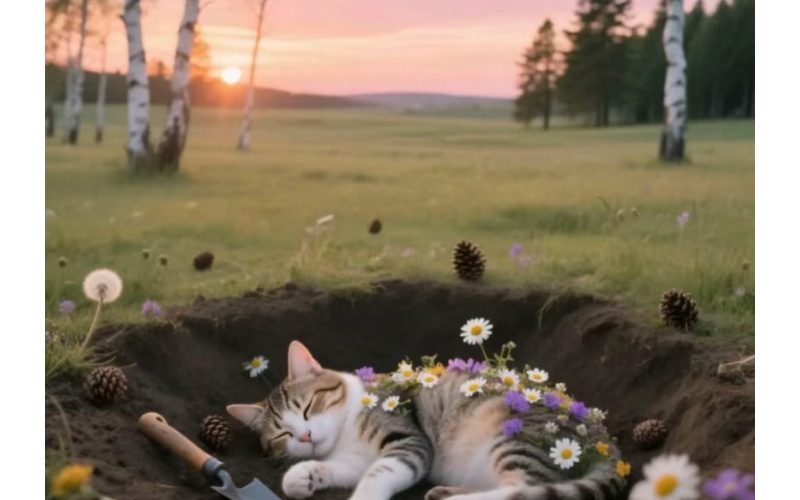
Wukong in the grave, shared by @余煌化妆师.

Paw prints left on Zhao’s heart, memories of happy snow days.

More examples of online tributes to Wukong.
There are also artists who draw Wukong, sometimes on paper (see here), but also on walls (see videos here and here).
In a way, these images have now become a form of resistance in the face of uncertainty, and Wukong has come to represent something bigger.
One Weibo user wrote:
📱 “I’ve been continuously following this case. Based on the latest updates from the ‘master’ [an online nickname for Zhao Shuo], it really feels like he’s been threatened and can no longer continue searching for clues. In the end, it’s the power of capital and background connections that’s suppressing us ordinary people.(..) Supporting the legislation of an Animal Protection Law is more urgent than ever — it starts with you and me. Speak up for Wukong, and for the countless stray animals out there!”
Although there are various laws in China regarding wildlife and the protection of animals, there currently is no national law that is explicitly against animal cruelty for all animals. In recent years, voices calling for better laws on animal abuse in China have grown louder.
As for Zhao Shuo, he is continuing his journey — leaving Xinjiang for Qinghai. In his latest video, he said he won’t talk about Wukong anymore. Beyond any external pressures he faces, it will take time for him to process the loss of his travel companion, whose legacy endures not only in his heart but also within a much wider online community.
“Thank you for bringing joy into my otherwise ordinary days,” one Weibo user wrote. “Goodnight, little Wukong, and don’t forget — we’ll miss you very much, you stinky cat. I think I’ll remember this story for a long time — we’ll often look back at the footprints you left behind.”🐾🔚
By Manya Koetse
(follow on X, LinkedIn, or Instagram)
Spotted a mistake or want to add something? Please let us know in comments below or email us. First-time commenters, please be patient – we will have to manually approve your comment before it appears.
©2025 Whatsonweibo. All rights reserved. Do not reproduce our content without permission – you can contact us at info@whatsonweibo.com.
Subscribe
What’s on Weibo is a reader-supported publication, run by Manya Koetse (@manyapan), offering independent analysis of social trends in China for over a decade. To receive new posts and support our work, consider becoming a paid subscriber.

Get in touch
Would you like to become a contributor, or do you have any tips or suggestions? Get in touch here!

China Faces Unprecedented Donkey Shortage Crisis

Nanchang Crowd Confuses Fan for Knife — Man Kicked Down and Taken Away

The Wong Kar-wai Scandal Explained: The Dark Side of ‘Blossoms Shanghai’

China’s National Day Holiday Hit: Jingdezhen’s “Chicken Chop Bro”

Evil Unbound (731): How a Chinese Anti-Japanese War Film Backfired

Hidden Cameras and Taboo Topics: The Many Layers of the “Nanjing Sister Hong” Scandal

“Jiangyou Bullying Incident”: From Online Outrage to Offline Protest

The Rising Online Movement for Smoke-Free Public Spaces in China

China Trend Watch: Pagoda Fruit Backlash, Tiananmen Parade Drill & Alipay Outage (Aug 11–12)

From Schadenfreude to Sympathy: Chinese Online Reactions to Charlie Kirk Shooting
Popular Reads
-

 China Memes & Viral3 months ago
China Memes & Viral3 months agoHidden Cameras and Taboo Topics: The Many Layers of the “Nanjing Sister Hong” Scandal
-

 China Books & Literature11 months ago
China Books & Literature11 months agoThe Price of Writing Smut: Inside China’s Crackdown on Erotic Fiction
-

 China Insight5 months ago
China Insight5 months agoUnderstanding the Dr. Xiao Medical Scandal
-

 China Memes & Viral10 months ago
China Memes & Viral10 months agoOur Picks: Top 10 Chinese Buzzwords and Phrases of 2024 Explained

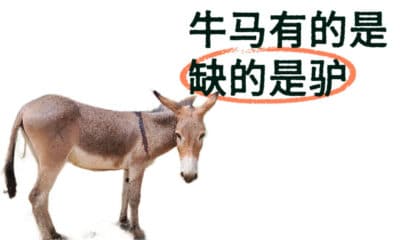




Marcia
May 11, 2019 at 12:23 am
Don’t believe the Chinese. Any country that can hold a so called festival like yulin and drag pet dogs out of owners hands or run dog meat trades isn’t to be called human and definitely cannot be trusted. These acts are well documented and filmed China you CANNOT deny any of it.